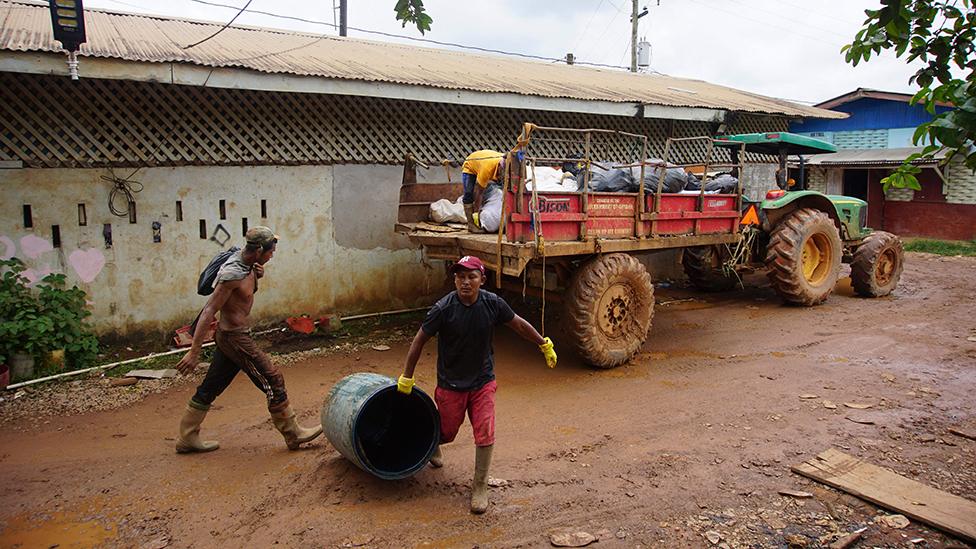Essequibo: Venezuela votes on claim to Guyana-controlled oil region
- Published
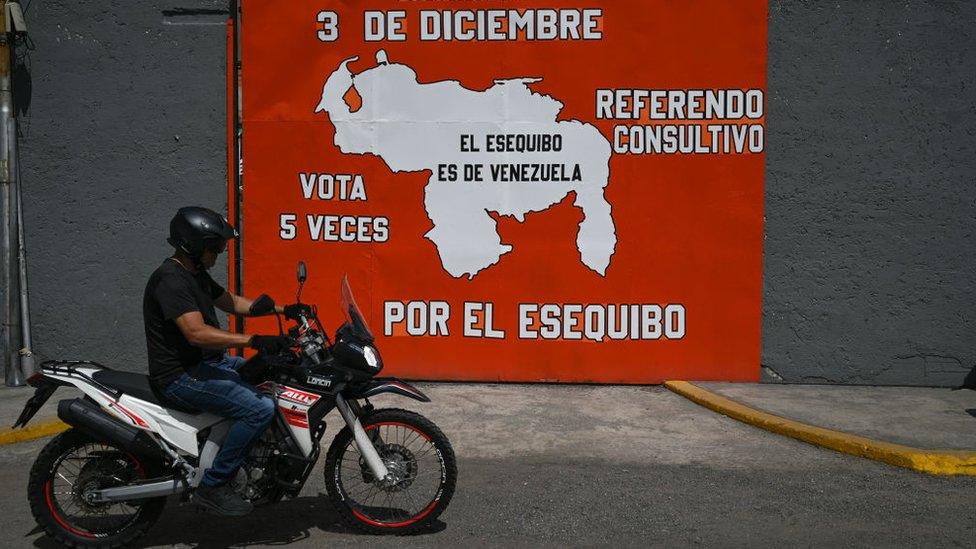
Both Venezuela and Guyana lay claim to the Essequibo region
Venezuelans are voting in a referendum on Sunday which has ratcheted up the tension between the South American country and its neighbour, Guyana.
The Venezuelan government has called the referendum to measure popular support for its historical claim to a contested oil-rich swathe of jungle currently administered by Guyana.
The 159,500-sq-km (61,600-square-mile) region is known as Essequibo and makes up two thirds of the total of the land currently controlled by Guyana. It is home to 125,000 of Guyana's 800,000 citizens.

The dispute over the area has been rumbling on for more than a century.
In 1899, an international arbitral tribunal awarded the area to Britain, which at the time was the colonial power ruling over Guyana, or British Guiana, as it was then known.

Guyana: Key facts
Capital: Georgetown
Area: 214,970 sq km
Population: 795,400
Languages: English, Guyanese Creole, plus others)
President: Irfaan Ali
Read more about Guyana: Guyana country profile

But this ruling has been dismissed as unfair by successive Venezuelan governments over the past 60 years.
In 1966, Britain and Venezuela reached an agreement - known as the Geneva Agreement - to establish a commission made up of representatives of Guyana, which became independent from Britain that same year, and Venezuela to revisit the territorial dispute.
But even though almost six decades have passed since, there still has been no resolution.
The dispute flared up in 2015, after US giant ExxonMobil discovered oil in Essequibo's offshore waters.
In 2018, Guyana took the case to the International Court of Justice (ICJ), after being given the green light by the Secretary-General of the United Nations.
The ICJ, based in The Hague, in the Netherlands, is the principal judicial body of the United Nations, with one of its primary roles being the resolution of legal disputes between states.
It can take years for the ICJ to issue rulings and the first step in most cases is for it to decide whether it has jurisdiction, that is whether it has the legal authority to rule on a particular dispute.
In 2020, the ICJ ruled that it had jurisdiction to hear the dispute but it has yet to decide on the merits of the case, meaning whether the 1899 arbitral award giving the Essequibo to Guyana stands.
Venezuela has not accepted that the ICJ has jurisdiction but has so far continued to attend the court's hearings.
Tension rose further, when the government of Guyana held an auction in September of this year at which oil companies bid for exploration licences in Essequibo waters.
This move and a further "significant" new oil discovery made in those waters just over a month ago has increased the pressure on the Venezuelan government.
Venezuela has the world's largest proven oil reserves but the US imposed sweeping sanctions on the South American country's oil sector in 2019.
The Venezuelan government, which has been led by President Nicolás Maduro since 2013, is also under international pressure to allow free and fair elections in 2024.
The US recently eased the sanctions it had imposed on Venezuela's oil industry in exchange for the government lifting a ban on the main opposition candidate, María Corina Machado.
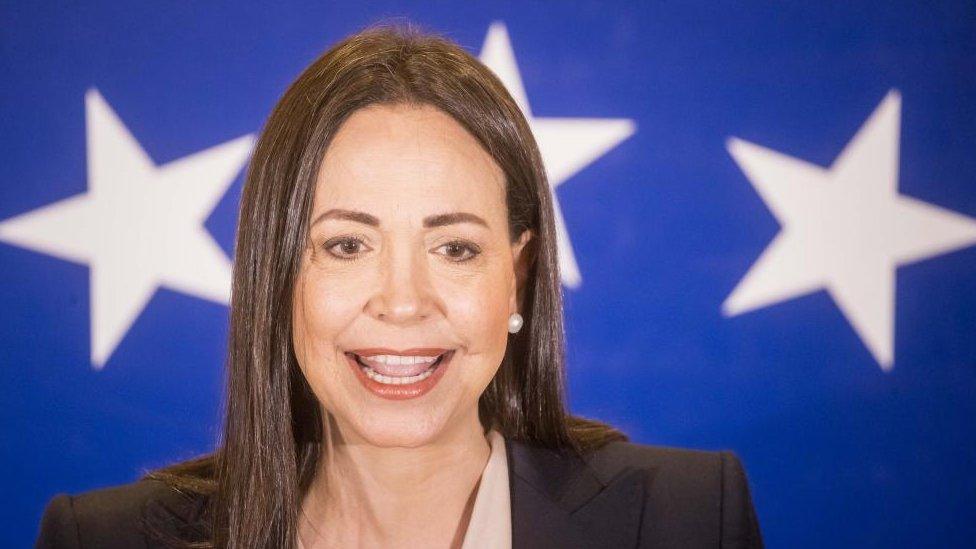
María Corina Machado won the opposition primary by a landslide but is banned from running for office
However, the ban on Ms Machado running for office currently still remains in place.
Many analysts see the Essequibo referendum as a tactical response by President Maduro to whip up nationalist fervour and distract from the calls for free and fair elections.
While the referendum is only consultative in nature - that is, it will not have any legal weight outside of Venezuela - Guyana has condemned it as an aggressive attempt at "annexation".
Venezuelan voters are being asked to provide a "Yes" or "No" answer to five questions.
The first two basically ask whether Venezuelans support the country's claim over the Essequibo region based on the Venezuelan arguments - the alleged invalidity of the 1899 arbitral award and the validity of the 1966 Geneva Agreement.
The third question asks voters if they agree with the Maduro government's refusal to accept that the ICJ has jurisdiction in the case.
This is a controversial question, since many Venezuelan opposition leaders and observers say snubbing the ICJ undermines Venezuela's position.
Question four asks if Venezuelans "agree to oppose by all means in accordance with the law" Guyana's "unilateral" use of the sea waters off Essequibo - a reference to Guyana issuing oil licencing for this offshore area.
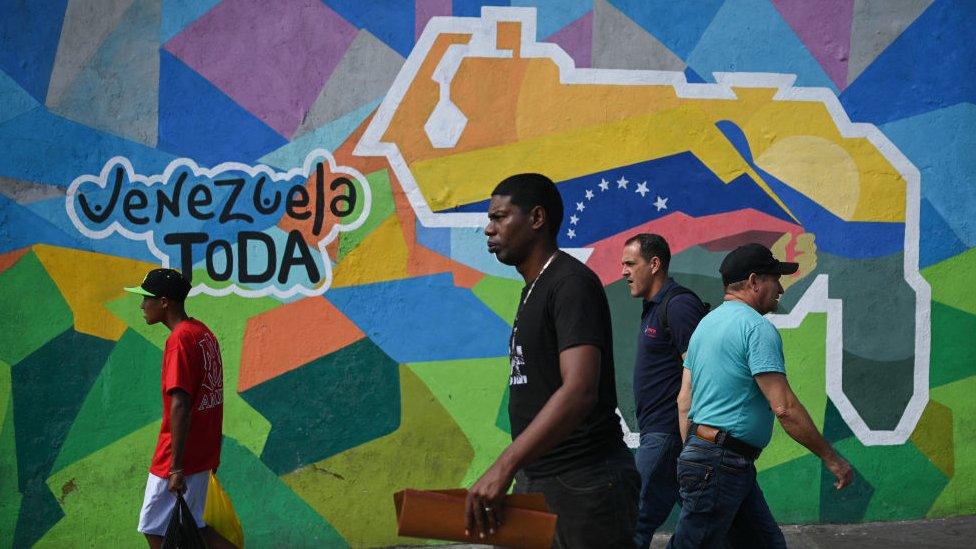
Graffiti supporting Venezuela's claim adorns the walls of a neighbourhood in Caracas
Critics have questioned the use of "by all means" in this question, wondering if this could include military force.
The fifth question asks for approval for "the creation of the Guayana Esequiba state" and its "incorporation into the map of Venezuelan territory", language particularly objected to by Guyana which says this amounts to the effective "annexation" of territory it currently administers.
Some observers are concerned about what the Maduro government plans to do if - as is widely expected - the result of the referendum shows ample backing for the five questions.
They point to plans announced by Venezuela's armed forces for the construction of an airstrip close to the current demarcation boundary with Guyana.
Pro-opposition security expert Rocío San Miguel warned the government was "using" the Essequibo issue following the success of the primary held by opposition parties in October, which saw more than 2.4m people turn out.
"Nothing is more potent to divert attention than to bring up a powerful, attractive issue that appeals to patriotic sentiment," Ms San Miguel said.
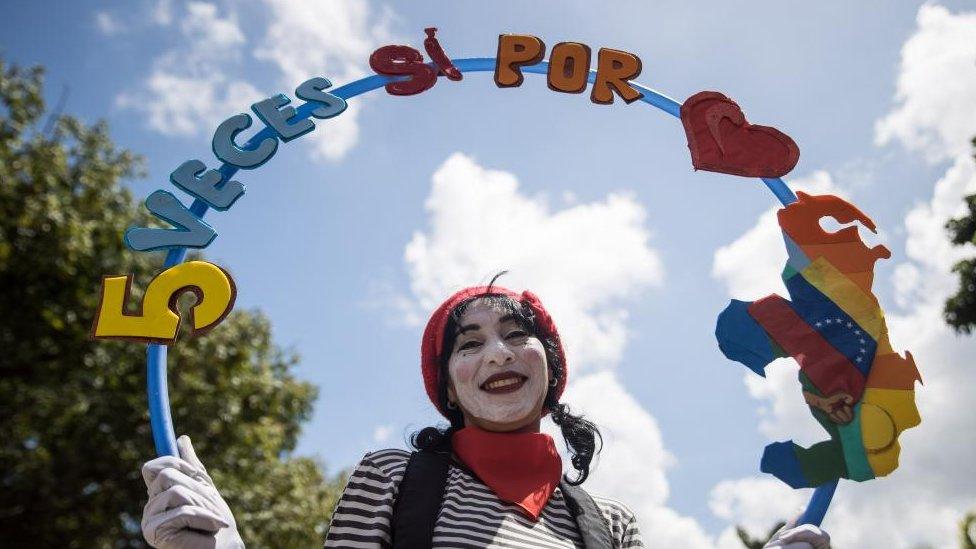
The Venezuelan government has been urging people to vote "five times 'yes'" in the referendum
She warned that some of the Essequibo referendum questions, if endorsed in the referendum, could give the Maduro government "ridiculous power" to potentially even initiate an armed conflict.
Guyana's Vice-President Bharrat Jagdeo has publicly warned Venezuela that any "aggressive acts" would "not go unpunished", adding that his government had "secured" widespread international support.
Guyanese President Irfaan Ali visited the Essequibo with military commanders in late November to reassure local inhabitants and declared he was committed to solving the border dispute "peacefully".
The ICJ also ordered Venezuela on Friday to refrain from any concrete action that may alter the status quo in the Essequibo.
Related topics
- Published11 September 2023
